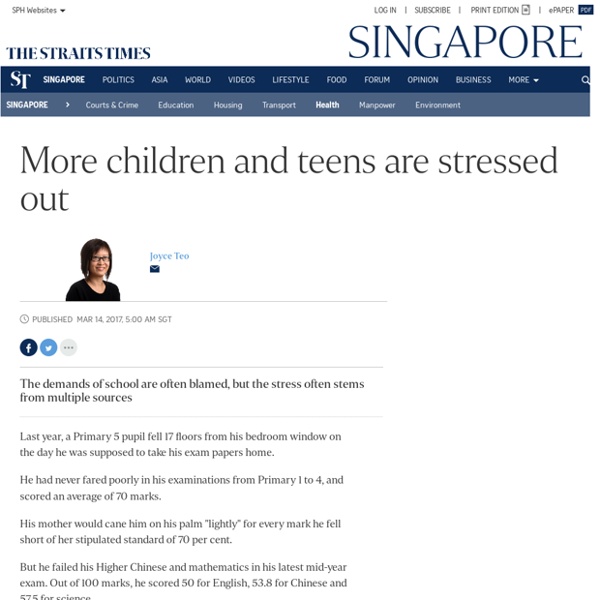More teens in Singapore seeking help for school stress
SINGAPORE (THE NEW PAPER) - More teenagers from top schools are seeking help at the Institute of Mental Health (IMH) for school-related stress. IMH said that stress-related, anxiety and depressive disorders are common conditions seen at its Child Guidance Clinics, which treat children aged six to 18. The clinics saw an average of about 2,400 new cases every year from 2012 to 2017. Since IMH does not track the causes of the disorders, it does not have statistics on cases related to school stress.
MOE, MSF ‘very concerned’ about spike in youth suicides; experts say more support and awareness necessary
SINGAPORE: The Ministry of Education (MOE) and Ministry of Social and Family Development (MSF) are “very concerned” about the spike in the number of youth suicides this year, said the ministries in a joint statement. “It is not yet a trend, but we must monitor this closely and take various measures to address it,” said spokespersons for the ministries in response to email queries from CNA. The number of suicides in Singapore rose 10 per cent last year, with suicides among boys aged 10 to 19 at a record high, the Samaritans of Singapore (SOS) said last week. A total of 94 people aged between 10 and 29 killed themselves last year, SOS said.
Understanding Stress
A moderate amount of stress can be good for you; it gets you excited about life, motivates you and improves your performance. When stress becomes too intense or continues for a prolonged period of time however, it becomes harmful and impacts our lives negatively. Everybody experiences stress.
Teens 'more depressed and sleeping less'
Image copyright Getty Images Adolescents are more likely to feel depressed and self-harm, and are less likely to get a full night's sleep, than 10 years ago, a study suggests. Yet smoking, alcohol and anti-social behaviour - often linked to mental health problems - were less common for 14-year-olds in 2015 than in 2005. Factors behind mental health problems may be changing, the University College London researchers said.
Teen stress rivals that of adults
If you think you're stressed out, imagine being a teenager in today's society. American teens say they experience stress in patterns similar to adults, and during the school year they report stress levels even higher than those reported by adults. These were the prime conclusions of APA's poll Stress in America™: Are Teens Adopting Adults' Stress Habits? The survey of adults and teens was conducted online on behalf of APA by Harris Interactive Inc. last August. Teens reported that their stress levels during the school year far exceeded what they believe to be healthy (5.8 vs. 3.9 on a 10-point scale) and topped adults' average reported stress levels (5.8 for teens vs. 5.1 for adults).
Social Stress: The cause, effects, and solutions - Ana - Medium
Resistance creates suffering. Stress happens when your mind resists what is. The only problem in your life is your mind’s resistance to life as it unfolds.” ~ Dan Millman Stress is a term most people are all too familiar with.
When Social Media Is Really Problematic for Adolescents
Dr. Ana Radovic, an assistant professor of pediatrics at UPMC Children’s Hospital of Pittsburgh, an adolescent medicine specialist who does research in mental health services, said that only about a third of teenagers with depression get treatment, and it can take a long time. At a clinic that serves teenagers who are severely depressed or suicidal, she began doing interviews about how they were using social media, and found she was hearing both positive and negative stories. “For example, there was one teen who shared with me that she enjoyed following a band that she liked on Instagram, and it made her feel better,” Dr. Radovic said. “And then all of a sudden she saw a picture of the band member self-harming and cutting her arm.”
Why are teenagers more stressed than ever?
Parents might be mindful of buffering their own stress from their teens. True, the parental brain has evolved to scan the environment for threats. But if parents pass on their stress, children can become overly stress-reactive, vigilant, and stress-sensitive. On the other hand, passing on constructive coping strategies is helpful. Building emotional intelligence skills is always important, too.




There are more younger people choosing more extreme methods to cope with their stress and what is more alarming is the age of young people feeling suicidal or have committed suicide continue to decrease over the years. In other words, there seem to be a trend in having more primary school children feeling stressed out and opting suicide as an option to their problems. Many children face the pressure to excel in their academic performance despite scoring all A's. I think parents play an important role in contributing to the pressure. Parents could unknowingly place unrealistic expectations on the child or reflecting what they could not achieve in their younger days to satisfy their regrets by imposing certain standards on the child. This also seems to be more common in asian context as well where academic performance is always the priority. by ytfoong002 Mar 19